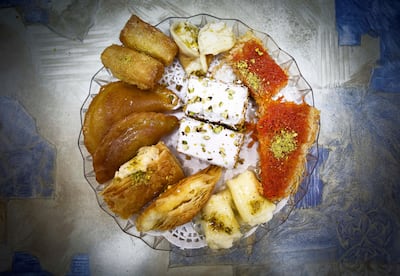Much like its English counterpart, sweet, the Arabic word "helu" has connotations that extend far beyond the realms of taste.
It can mean beautiful. A haircut can be helu. A person can be helu or helwe, depending on whether they are male or female. The word can be used as a compliment, or, with the right inflection, be used sarcastically or even with a sneer.
Helu is used in colloquial Arabic to describe everything from knafeh to the weather and even a friend’s new car. It appears without fail in almost every Arabic pop song about love. Several even have the word in their titles, from Lebanese singer Ziad Bourji’s Shou Helu (How Sweet) to Dalida’s Helwa Ya Baladi (My Beautiful Country) and Tamer Hosny's Helu al Makan (The Place is Nice).

Because Arabic nouns are gendered, adjectives such as helu transform to be in agreement with the gender in question.
A car – or siara – is helwe. Taste – ta’m – is helu. Weather – taqs – is helu. A scent – reeha – is helwe.
Used in the plural, the word takes the form helween. A couple that look good together can be helween sawwa.
Circling back to knafehs and other desserts, a person who makes and sells sweets is called a halawani. Whatever is cooked with sugar is usually called halawe. Get someone a present for graduating from university or getting a job promotion, and you’ve presented them with halawat alnajah (sweets of success).
The word can have more scathing overtones. If someone does something that’s worthy of frown, accentuate the first letter and extend the last and you’ll surely have them rethink their actions. Say it with a smile and it’ll be taken as a compliment.
Have a friend who’s particularly good with words? His/her tongue is lisano/lisanha helu/helwe.
In essence, helu does not differ too much from the English word. As much as we can use the word "sweet" in several instances and with a plethora of meanings, helu can be a dependable word to keep at the tip of your tongue. Just be mindful of your intonation.


